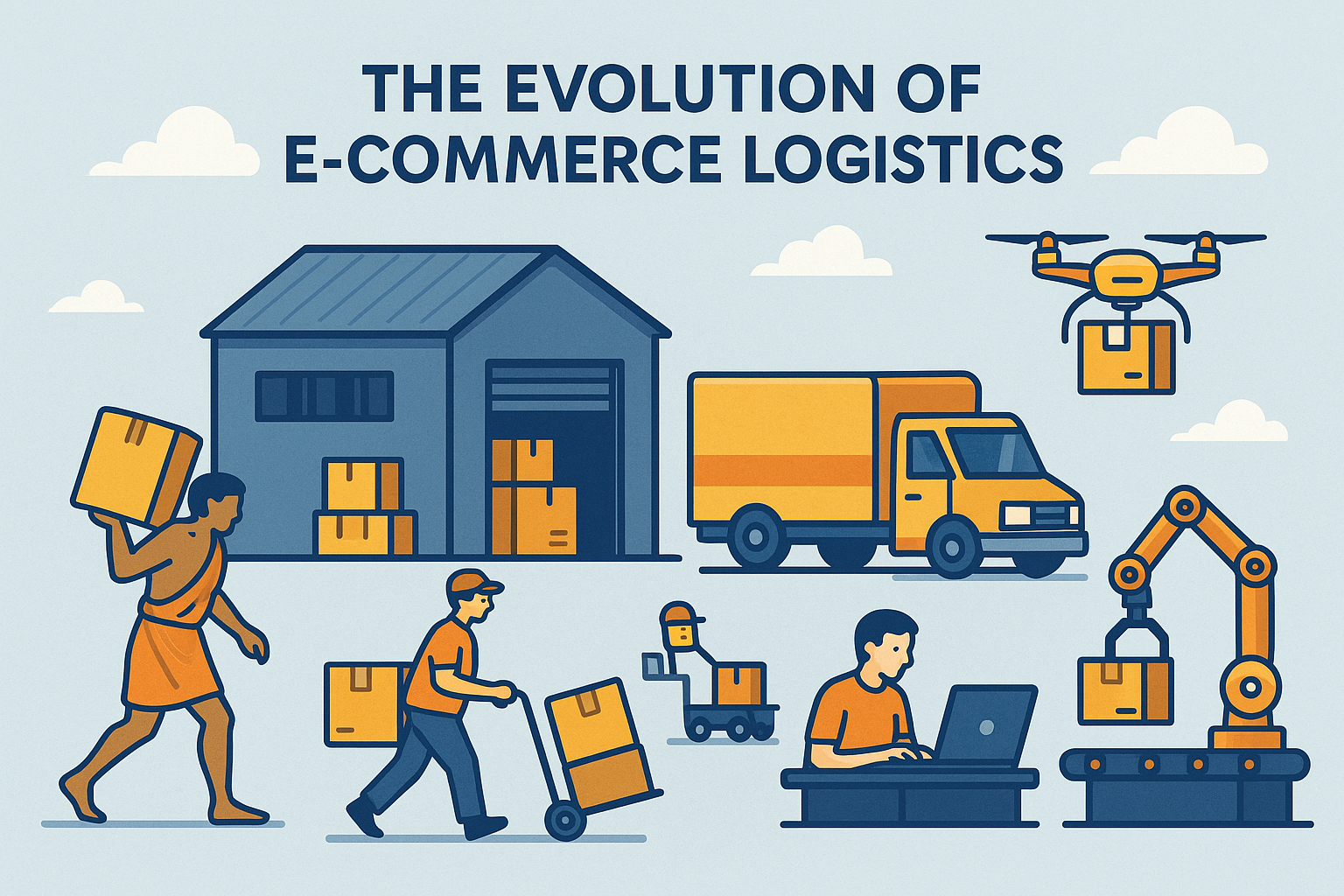The rapid growth of e-commerce has reshaped the global retail landscape, driving unprecedented changes in how goods are transported, stored, and delivered.
The evolution of e-commerce logistics, from the integration of cutting-edge technologies to the rise of customer-centric models, reflects the need to meet soaring customer expectations.
This evolution is important for the success of any e-commerce business, as it ensures efficient shipping and delivery for online retailers.
This blog explains the pivotal trends, challenges, and innovations shaping the e-commerce logistics sector and offers insights into how businesses adapt to these new market demands.
Let's Get Straight to the Point

The evolution of e-commerce logistics has revolutionised how goods are transported, stored, and delivered.
This blog explains key aspects, such as the impact of e-commerce growth on supply chain management, the rise of advanced technologies such as AI, IoT, and blockchain, and the importance of efficient last-mile delivery to meet rising customer expectations.
Infrastructure advancements, such as mega fulfilment centres and partnerships with third-party logistics providers, are critical to addressing increased demand and cost efficiency.
Looking ahead, sustainability, real-time tracking, and customer-centric solutions will define the future of the logistics industry.
What is E-Commerce Logistics?
E-commerce logistics refers to the comprehensive process of managing the movement of goods in an online retail environment. This subset of business logistics encompasses transportation, storage, and delivery processes to ensure a seamless customer experience.
Successful logistics operations in online shopping hinge on efficient systems, such as inbound e-commerce logistics, which involves receiving and managing goods from suppliers.
The rising importance of e-commerce businesses has redefined how logistics management is approached, focusing on optimising inventory, transportation, and delivery processes to meet customer demand.
Modern e-commerce logistics also integrates cutting-edge technology and analytics to streamline processes. Businesses must align logistics strategies with customer expectations, offering solutions that enhance convenience, speed, and reliability.
Whether it involves same-day delivery or real-time tracking, the logistics framework influences customer satisfaction and loyalty.
The Impact of E-Commerce on Supply Chain Management

The exponential rise of e-commerce has significantly impacted supply chain management, challenging traditional models. By 2026, approximately 24% of global retail purchases are projected to occur online, reflecting the massive growth of the e-commerce sector.
This growth has reshaped supply chain operations, necessitating innovative strategies and technologies. E-commerce logistics companies are now tasked with offering flexible solutions, such as next-day delivery, time-window preferences, and hybrid models like in-store pickups.
Advanced technologies like big data analytics and cloud computing are increasingly critical for improving supply chain visibility.
Key Transformations in Supply Chains
Digitisation of Processes: Adopting digital tools for inventory management, real-time tracking, and predictive analytics.
Global Reach: Facilitated by streamlined shipping networks and efficient customs management.
Customer-Centric Models: Focus on delivering tailored experiences by understanding customer needs.
As the e-commerce industry evolves, companies must ensure their supply chains are resilient and flexible to adapt to dynamic market conditions.
Commerce Logistics Infrastructure
The rise of e-commerce growth has driven the development of sophisticated commerce logistics infrastructure, including:
Mega fulfilment centres: Massive warehouses exceeding 500,000 sq ft, operating 24/7 to cater to fast delivery demands.
Parcel hubs: Central locations to streamline the delivery process.
Distribution centres: Facilities focused on consolidating goods for efficient last-mile delivery.
Logistics aggregators: Platforms connecting businesses with delivery services to enhance efficiency.
These innovations underline the vital role of infrastructure in meeting the needs of e-commerce businesses and addressing challenges such as increased demand and environmental sustainability.
Role of Fulfilment and Distribution Centres
Fulfilment and distribution centres are the backbone of the logistics sector. They optimise inventory levels, reduce lead times, and enhance the speed of mile delivery.
Efficient warehouse management within these centres ensures that online businesses can handle peak demand during seasons like holidays and sales events.
Technology in E-Commerce Logistics
Technology is the cornerstone of modern e-commerce logistics, transforming processes and enhancing efficiency. Key advancements include:
1. Artificial Intelligence (AI)
AI-driven platforms enable route optimisation, demand forecasting, and improved inventory management, helping businesses reduce costs and improve customer satisfaction. AI-powered chatbots and customer service systems also enhance the post-purchase experience.
2. Blockchain
Blockchain enhances supply chain transparency, ensuring authenticity and security in commerce logistics. This reduces risks like counterfeiting and fosters customer trust. It also allows for better documentation and compliance in international shipping.
3. Internet of Things (IoT)

IoT sensors facilitate real-time tracking of packages, providing valuable updates to businesses and customers.
This enhances accuracy in the delivery process and fosters customer satisfaction. IoT devices also help monitor storage conditions, ensuring sensitive items like perishables maintain quality.
4. Big Data and Cloud Computing
Big data analytics helps predict trends and manage inventory levels, while cloud computing ensures scalable solutions for the logistics industry. These technologies help businesses forecast demand, optimise resource allocation, and improve logistics efficiency.
Last-Mile Delivery Solutions
E-commerce businesses rely heavily on efficient last-mile logistics to ensure customer satisfaction and loyalty. Last-mile delivery is the final and most critical step in the delivery process.
This step transports goods from fulfilment centres to the final delivery destination. Efficient last-mile logistics directly impact customer satisfaction and loyalty.
Innovative Solutions
Parcel lockers: Secure, convenient pick-up points.
Route optimisation software: Reducing transit time and fuel costs.
Local partnerships: Collaborating with businesses in urban areas to act as pick-up or drop-off locations.
Efficient last-mile delivery involves integrating advanced technologies like drones and autonomous vehicles to address urban and rural challenges. The focus remains on reducing costs, improving speed, and minimising the carbon footprint.
The Role of Third-Party Logistics (3PL) Providers
Third-party logistics providers are pivotal in the logistics sector, offering tailored solutions for online businesses. Services include:
Warehouse management: Streamlining inventory management and fulfilment services.
Global logistics management: Helping businesses expand across different countries.
Transporting goods: Leveraging their resource networks to optimise efficiency.
By partnering with 3PL companies, e-commerce businesses can achieve greater scalability and flexibility in their supply chain operations.
Benefits of 3PL Providers
Access to professional expertise and advanced infrastructure.
Flexibility in scaling operations during peak seasons.
Enhanced customer service through efficient mile delivery processes.
Market Demands and Trends
The e-commerce business continues to face evolving market demands. The focus on same-day and next-day delivery has pressured logistics providers to innovate. Trends shaping the market include:
Sustainability: Minimising the carbon footprint of deliveries.
Advanced technologies: Leveraging artificial intelligence and real-time tracking for better service.
Customer needs: Meeting ever-changing customer expectations with faster and more accurate deliveries.
Key Performance Indicators (KPIs)
Logistics providers measure success through KPIs such as:
On-time delivery rates.
Inventory turnover.
Shipping cost efficiency.
These indicators help identify areas for improvement and drive innovation to enhance the overall delivery process.
The Importance of Supply Chain Visibility

Supply chain visibility is essential for e-commerce businesses to thrive. Transparency allows companies to monitor packages through real-time tracking, enhancing customer satisfaction and enabling better route optimisation.
A transparent supply chain also improves resource allocation in warehouse management and forecasts inventory levels, making it indispensable in modern logistics management.
Enhanced Benefits
Greater predictability in supply chain operations.
Improved risk management and contingency planning.
Higher efficiency in handling disruptions such as delays or shortages.
Overcoming Logistics Challenges
E-commerce logistics companies face significant challenges, including:
Managing complex supply chains.
Ensuring timely and accurate deliveries.
Balancing cost efficiency with quality service.
1. Collaborative Models
Collaborating with third-party logistics providers can help businesses overcome these challenges. Shared resources and expertise allow for the following:
Reduced operational costs.
Enhanced efficiency in the final step of delivery.
Improved adaptability to fluctuating customer needs.
2. Embracing Digital Transformation
Logistics companies must prioritise digital transformation by adopting AI, IoT, and blockchain technologies to enhance efficiency, transparency, and customer experience.
The Future of E-Commerce Logistics
The future of e-commerce logistics lies in continuous adaptation and technological innovation. Emerging trends include:
Greater integration of AI, blockchain, and IoT.
Enhanced focus on last-mile delivery solutions.
Expanding the role of big data analytics to anticipate trends.
1. Sustainability and Efficiency
The logistics sector will increasingly prioritise reducing its operations' environmental impact. Innovations like electric vehicles and drone deliveries may become mainstream, aligning with global efforts to combat climate change.
2. Meeting Customer Expectations
Future logistics strategies will focus on delivering speed, accuracy, and reliability to meet evolving customer expectations. Businesses that can adapt to these changes will retain a competitive edge in the fast-paced e-commerce sector.
Conclusion
The evolution of e-commerce logistics underscores the dynamic nature of this industry. From adopting advanced technologies to meeting rising customer expectations, the logistics sector is important in supporting e-commerce growth.
By addressing challenges and embracing innovation, logistics providers can ensure they remain at the forefront of a rapidly transforming market.
FAQs
1. What is e-commerce logistics?
E-commerce logistics involves managing goods' transportation, storage, and delivery in an online retail environment. It ensures that products move efficiently from suppliers to customers while meeting expectations for speed and reliability.
2. Why is last-mile delivery important in e-commerce?
Last-mile delivery is the final step in delivering goods to customers and directly impacts customer satisfaction. Efficient last-mile solutions, like route optimisation and parcel lockers, are key to providing fast and accurate deliveries.
3. How do third-party logistics (3PL) providers support e-commerce businesses?
3PL providers handle tasks like warehouse management, transportation, and global logistics. They offer expertise and scalable solutions, enabling e-commerce businesses to reduce costs and improve supply chain efficiency.
4. What role does technology play in e-commerce logistics?
Technology like AI, IoT, and blockchain optimises inventory, enhances supply chain transparency, and enables real-time tracking. These advancements improve efficiency, reduce costs, and meet rising customer expectations. For an e-commerce business, such technology is important in adapting to the evolving logistics sector, ensuring efficient shipping and delivery, and overcoming challenges to optimise logistics networks.
5. What are the main challenges in e-commerce logistics?
Key challenges include managing complex supply chains, ensuring timely deliveries, and balancing cost efficiency with quality service. Solutions involve leveraging advanced technologies and partnering with third-party logistics providers.
